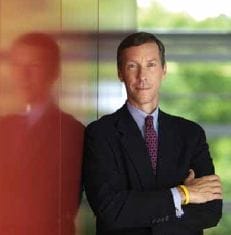“He joined Vanguard in July of ’82, a couple of weeks before the great bull market started, then announced his retirement not quite at the market’s peak, but darn close,” McNabb says wryly.
By contrast, McNabb, WG’83, took over in August of 2008. By early fall, the subprime mortgage market had helped propel the stock market into its biggest free fall since the Great Depression.
Indeed, McNabb’s first year as CEO of the suburban Philadelphia-based mutual fund giant has been one of long hours and far more time spent communicating than strategizing. But in spite of the mayhem, McNabb has few complaints. “It’s been really gratifying to see people rise to the occasion,” he says.
McNabb, 51, joined Vanguard 22 years ago as a guaranteed investment contract specialist, a job he told the New York Times he was not qualified for and knew little about. “But Jack Brennan, who was then the CFO, talked about what kind of a company Vanguard would become. I liked his vision and his Midwestern values,” McNabb said in the interview. McNabb went on to serve in several senior management roles and lead each of Vanguard’s client-facing business divisions.
As an undergraduate at Dartmouth, he studied government. After graduation, he took a job teaching first-year Latin at the Haverford School near Philadelphia. It was a post that allowed him to coach a variety of sports, earn his MBA at Wharton and pursue his passion for rowing, a sport he credits for his strong belief in the team over the individual.
The past year has solidified that belief. “Obviously when things began to unfold last fall we found ourselves very much in contingency mode,” he says. “We were meeting as an executive team three, four, five times a day and keeping a conference room well stocked right outside my office.”
Avoiding market landmines was a key focus of those meetings, as well as managing and responding to the torrent of calls and emails from investors.
“We had to make sure our service infrastructure could handle whatever was thrown at it, from phone call volume to web traffic. We had record traffic on our website,” he says. “We really underscored getting out there in front … We tried to be factual and communicate to people that the world wasn’t going to come to an end.”
Phone associates were given special training to manage the myriad of anxious questions from shareholders, while Vanguard’s institutional investment team members were sent out to meet face to face with jittery clients.
For McNabb, the past year has also meant a shift in the way he expected to spend his time as a new CEO. “Right now I am spending less time on long-term strategy than a typical CEO school would say you should,” he says. “But I think people need to be here for our investors and frankly being here for our people is way more important.” At the time of his appointment, analysts predicted McNabb would push aggressively into expansion overseas, plans he says he fully intends to pursue. “We had some success over the last decade going overseas and that has been a toe in the water.”
But despite some easing of credit markets and a market rally in March, McNabb predicts continued economic instability and higher unemployment in the months ahead.
“We were very worried about the subprime crisis,” McNabb says. “But I don’t think anyone fully saw that it would explode into a broader financial crisis and frankly into a global crisis. If you had told me in the fall of 2007 where we would be today I would have said, ‘I don’t think so.’ But one of the things you learn is to balance the here and now with the longer term future. We spend a lot of time thinking about that balance.”
As he considers the havoc wrought by the financial crisis, McNabb argues that “the Whartons of the world” need to focus more on inculcating future business leaders with concepts of principled leadership.
The $1 trillion Vanguard, McNabb says, works to teach employees about the role of paradox — the ability to hold two seemingly contradictory ideas. He cites the company’s simultaneous focus on low cost and high quality, two concepts that are typically at odds. Similarly, Vanguard works to create a caring, responsive environment for employees, but also holds them to “incredibly difficult and high performance standards. Some people would see that as a paradox,” he says. “I don’t.”
“There’s a great quote from [conservative African American politician and former football player] J.C. Watts: ‘Character is doing the right thing when nobody is looking,’ ” McNabb says. “We tell people to lead by example.”

























